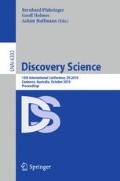Abstract
In this paper, we investigate the application of descriptive data mining techniques, namely subgroup discovery, for the purpose of the ad-hoc analysis of election results. Our inquiry is based on the 2009 German federal Bundestag election (restricted to the City of Cologne) and additional socio-economic information about Cologne’s polling districts. The task is to describe relations between socio-economic variables and the votes in order to summarize interesting aspects of the voting behavior. Motivated by the specific challenges of election data analysis we propose novel quality functions and visualizations for subgroup discovery.
Access this chapter
Tax calculation will be finalised at checkout
Purchases are for personal use only
Preview
Unable to display preview. Download preview PDF.
References
Atzmüller, M., Puppe, F.: Semi-automatic visual subgroup mining using vikamine. J. UCS 11(11), 1752–1765 (2005)
Atzmüller, M., Puppe, F.: SD-map - a fast algorithm for exhaustive subgroup discovery. In: Fürnkranz, J., Scheffer, T., Spiliopoulou, M. (eds.) PKDD 2006. LNCS (LNAI), vol. 4213, pp. 6–17. Springer, Heidelberg (2006)
Bayardo, R.J., Agrawal, R., Gunopulos, D.: Constraint-based rule mining in large, dense databases. Data Min. Knowl. Discov. 4(2/3), 217–240 (2000)
Boley, M., Grosskreutz, H.: Non-redundant subgroup discovery using a closure system. In: ECML/PKDD, vol. (1), pp. 179–194 (2009)
Gebhardt, F.: Choosing among competing generalizations. Knowledge Acquisition 3, 361–380 (1991)
Grosskreutz, H., Rüping, S., Wrobel, S.: Tight optimistic estimates for fast subgroup discovery. In: ECML/PKDD, vol. (1), pp. 440–456 (2008)
Huang, S., Webb, G.I.: Discarding insignificant rules during impact rule discovery in large, dense databases. In: SDM (2005)
Johnston, R., Pattie, C.: Putting Voters in Their Place: Geography and Elections in Great Britain. Oxford Univ. Press, Oxford (2006)
Klösgen, W.: Explora: A multipattern and multistrategy discovery assistant. In: Advances in Knowledge Discovery and Data Mining, pp. 249–271 (1996)
Kralj, P., Lavrač, N., Zupan, B.: Subgroup visualization. In: Proc. 8th Int. Multiconf. Information Society, pp. 228–231 (2005)
Lavrac, N., Gamberger, D.: Relevancy in constraint-based subgroup discovery. In: Boulicaut, J.-F., De Raedt, L., Mannila, H. (eds.) Constraint-Based Mining and Inductive Databases. LNCS (LNAI), vol. 3848, pp. 243–266. Springer, Heidelberg (2006)
Lavrac, N., Kavsek, B., Flach, P., Todorovski, L.: Subgroup discovery with cn2-sd. J. Mach. Learn. Res. 5(February), 153–188 (2004)
Leman, D., Feelders, A., Knobbe, A.: Exceptional model mining. In: Daelemans, W., Goethals, B., Morik, K. (eds.) ECML PKDD 2008, Part II. LNCS (LNAI), vol. 5212, pp. 1–16. Springer, Heidelberg (2008)
Mochmann, I.C.: Lifestyles, social milieus and voting behaviour in Germany: A comparative analysis of the developments in eastern and western Germany. PhD thesis, Justus-Liebig-University Giessen (2002)
Morik, K., Boulicaut, J.-F., Siebes, A. (eds.): Local Pattern Detection. LNCS (LNAI), vol. 3539. Springer, Heidelberg (2005)
Nijssen, S., Guns, T., Raedt, L.D.: Correlated itemset mining in roc space: a constraint programming approach. In: KDD, pp. 647–656 (2009)
Novak, P.K., Lavrač, N., Webb, G.I.: Supervised descriptive rule discovery: A unifying survey of contrast set, emerging pattern and subgroup mining. J. Mach. Learn. Res. 10, 377–403 (2009)
Robinson, W.S.: Ecological correlations and the behavior of individuals. Am. Sociolog. Rev. (1950)
Webb, G., Zhang, S.: Removing trivial associations in association rule discovery. In: ICAIS (2002)
Webb, G.I.: Discovering significant patterns. Mach. Learn. 71(1), 131 (2008)
Wrobel, S.: An algorithm for multi-relational discovery of subgroups. In: PKDD 1997, pp. 78–87. Springer, Heidelberg (1997)
Author information
Authors and Affiliations
Editor information
Editors and Affiliations
Rights and permissions
Copyright information
© 2010 Springer-Verlag Berlin Heidelberg
About this paper
Cite this paper
Grosskreutz, H., Boley, M., Krause-Traudes, M. (2010). Subgroup Discovery for Election Analysis: A Case Study in Descriptive Data Mining. In: Pfahringer, B., Holmes, G., Hoffmann, A. (eds) Discovery Science. DS 2010. Lecture Notes in Computer Science(), vol 6332. Springer, Berlin, Heidelberg. https://doi.org/10.1007/978-3-642-16184-1_5
Download citation
DOI: https://doi.org/10.1007/978-3-642-16184-1_5
Publisher Name: Springer, Berlin, Heidelberg
Print ISBN: 978-3-642-16183-4
Online ISBN: 978-3-642-16184-1
eBook Packages: Computer ScienceComputer Science (R0)

